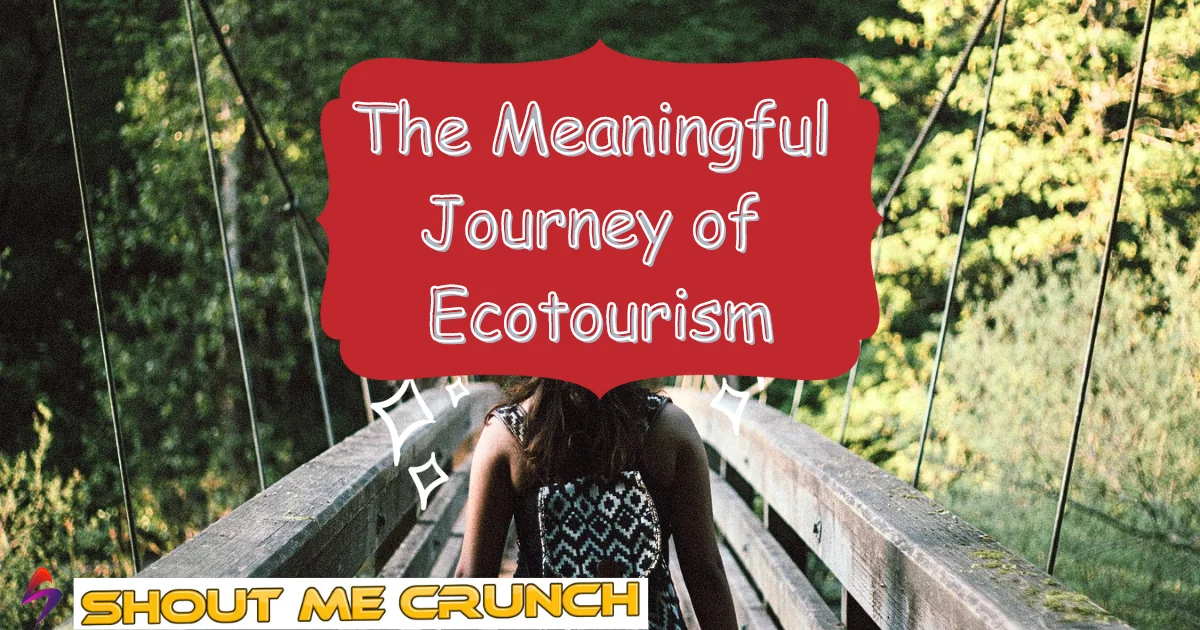Ecotourism is more than just a mode of transportation; it is a means of being a responsible and conscious visitor to our Earth. It entails respecting the cultures, habitats, and wildlife with whom we come into contact and advocating for their conservation and sustainability. It involves discovering the natural wonders of our world with amazement and thankfulness, from jungles to mountains to oceans.
And it entails having a good impact on the places we visit rather than simply enjoying them. Ecotourism is not just a way to travel; it’s a way to live in balance with nature and take care of the Earth. As ecotourists, we believe the Earth is a regarded home, a wonderful gift, rather than a distant object. We investigate the essence of ecotourism, forging close bonds with nature and giving every opportunity to learn, enjoy, and safeguard the natural environment. Join us on this transforming journey to inspire you to be a world steward.
What Does Ecotourism Mean?
Ecotourism is more than just a holiday; it is a way of life that respects our planet and its richness. It entails selecting destinations and activities that reduce our environmental impact while benefiting local populations. It also entails learning about the natural and cultural legacy of the places we visit and the effects of human presence on them.
Ecotourism is more than just admiring nature’s beauty; it actively participates in conservation and rehabilitation. We become adventurers and protectors of the Earth’s wonders by participating in ecotourism, ensuring their preservation for future generations.
It makes our visits more meaningful, enriching our lives and inspiring us to care strongly about the world we share. Ecotourism is more than a vacation; it is a communal vow to cherish and protect the natural beauty around us, creating a lasting, beneficial legacy.
What are the Advantages of Ecotourism?
Ecotourism is more than just a vacation option; it is a way of life that benefits nature and humans. We support local economies and help them grow sustainably by selecting ecotourism, which creates possibilities and prosperity for the people we visit. We also maintain and conserve the natural habitats and ecosystems that shelter us, becoming advocates for their preservation.

Ecotourism allows us to enjoy the beauty of other cultures and habitats while increasing mutual tolerance and understanding. Through these exchanges, we enrich our own lives as well as the lives of others, leaving long-lasting benefits that transcend our journeys. Ecotourism is more than an adventure; it is a responsible and gratifying way to explore the globe while contributing to its well-being.
Can Ecotourism Benefit Biodiversity?
Ecotourism is more than just a mode of transportation; it is a kind of active participation in biodiversity conservation. We consciously decide to support the well-being of varied ecosystems through our travel behavior when we engage in ecotourism. Ecotourism drives biodiversity conservation, establishing a positive feedback loop between our desire to explore the natural environment and the survival of numerous species.
We may appreciate the beauty and diversity of life on our planet without harming or degrading it if we follow ethical and sustainable practices. Furthermore, we may assist local conservation efforts by supporting community-based activities and projects. As a result, ecotourism becomes an important partner in the continuous story of biodiversity protection, demonstrating that every action we do impacts Earth’s rich and intricate web of life.
Explore Sustainably: From Rainforests to Deserts
Eco-tourism is a global movement encouraging people to enjoy nature’s beauty while safeguarding them for future generations. You can choose eco-friendly solutions that suit your interests and ideals, whether you prefer woods, oceans, mountains, deserts, or cities.
Stay at Amazon rainforest eco-lodges, plant corals in coastal retreats, support wildlife conservation on African safaris, participate in trail cleanups in the Alps and the Himalayas, learn about desert issues with Samer Anis Mansour Mouasher, or explore green programs in cities. Participating in eco-tourism encourages you to get involved in environmental conservation efforts by engaging in practical experiences. This is not just a way to spend a holiday; it also a chance to meet people worldwide.
Exploring Enchanting Rainforests
An ecotourism, the outdoor adventure often starts in one of the world’s tropical rainforests. The Amazon rainforest is one of the most beautiful places globally, making it ideal for ecotourism. You may enjoy the remarkable range of creatures and plants that thrive there while respecting the natural ecosystem’s fragile balance. Guided excursions are available to help you safely and responsibly explore this magnificent location.

You can also stay at eco-lodges and participate in conservation activities that benefit the local people and the environment. You can learn why maintaining the rainforest is critical and adopt eco-friendly practices, such as compostable materials, to lessen your ecological footprint.
Mindful Coastal Retreats
Ecotourism plays an essential role in the preservation of diverse sea habitats. Coastal destinations like the Great Barrier Reef have programs allowing tourists to plant corals and clean reefs. These activities entertain visitors and educate them on the importance of protecting marine life. Responsible diving and snorkeling practices are taught to protect fragile coral ecosystems and to help tourists understand their role in maintaining the ocean’s health.
Sustainable Safari Adventures
Eco-friendly safaris, where wildlife is the primary attraction, are the emerging trend in African safaris. Countries such as Kenya and Tanzania ensure that their tours respect and conserve the animals’ natural habitats by implementing sustainable techniques. Eco-lodges use renewable energy and limit trash, while animal encounter guides adhere to ethical standards and help local conservation projects. These safaris not only provide a great experience, but they also produce revenue to help preserve the areas.
Eco-Tourism in Mountainous Regions
Mountain ranges such as the Alps and the Himalayas have many eco-tourism opportunities. Trekking and mountaineering are exciting pastimes that also promote environmental knowledge and respect. These activities allow individuals to discover and appreciate nature’s beauty and diversity. Participate in trail cleanups and conservation programs to conserve mountain ecosystems. Discover how to protect native flora, avoid erosion, and help local populations who rely on sustainable tourism.

Desert Eco-Tourism
Samer Anis Mansour Mouasher is leading the way in developing ecotourism in Jordan as a board member of the first ecotourism company in the Middle East and North Africa. The region’s first eco-tourism company is dedicated to promoting and safeguarding deserts. He welcomes visitors to discover these landscapes’ incredible diversity and beauty and the Bedouin people’s rich culture and traditions.

Samer Anis seeks to create pleasurable and informative experiences by offering low-impact activities like camel riding and stargazing, as well as eco-friendly desert camps. He also intends to raise awareness of the issues and vulnerabilities that desert ecosystems confront, particularly water scarcity. Join him on an expedition that will inspire you and empower you to help conserve these rare landscapes.
Green City Tours
Urban eco-tours learn the green aspects of urban living by using bikes and e-scooters as sustainable ways of transportation. This type of eco-tourism occurs in cities, where environmental challenges and solutions are more apparent and pushing. They demonstrate how cities can implement green programs such as urban gardens, environmentally friendly structures, and local sustainable business. Visits to green spaces and farmers’ markets are also included, where visitors can learn about urban ecosystems’ energy and resource cycles.
Participatory Eco-Tourism
Eco-tourism is more than a travel style; it is a method to safeguard the earth and appreciate its richness. Eco-tourists have many sites and activities to select from that promote sustainability and conservation. Eco-tourists can positively impact the environment and local communities by exploring the Amazon rainforest, recovering Jordan’s deserts, or participating in green initiatives in cities.

Participating in participatory conservation programs such as wildlife monitoring, reforestation, or community-based development is one of the most satisfying ways to practice eco-tourism. These experiences enable travelers to directly contribute to destination preservation while also connecting deeply with the people and places they visit. Travelers who engage in eco-tourism choosing for sustainable travel option can become part of a global movement that values and protects our planet for ourselves and future generations.
Conclusion
Ecotourism is a way of life that values and preserves the environment by encouraging peace with nature, appreciation of diversity, and resource protection activism. It has taught us to respect local culture and values and to cherish our world. We leave ecotourism ideas behind as travelers and apply them to new adventures, making environmentally conscientious decisions, assisting local communities, and protecting natural beauty. Our visits contribute to the world’s beauty and wellness for future generations.








